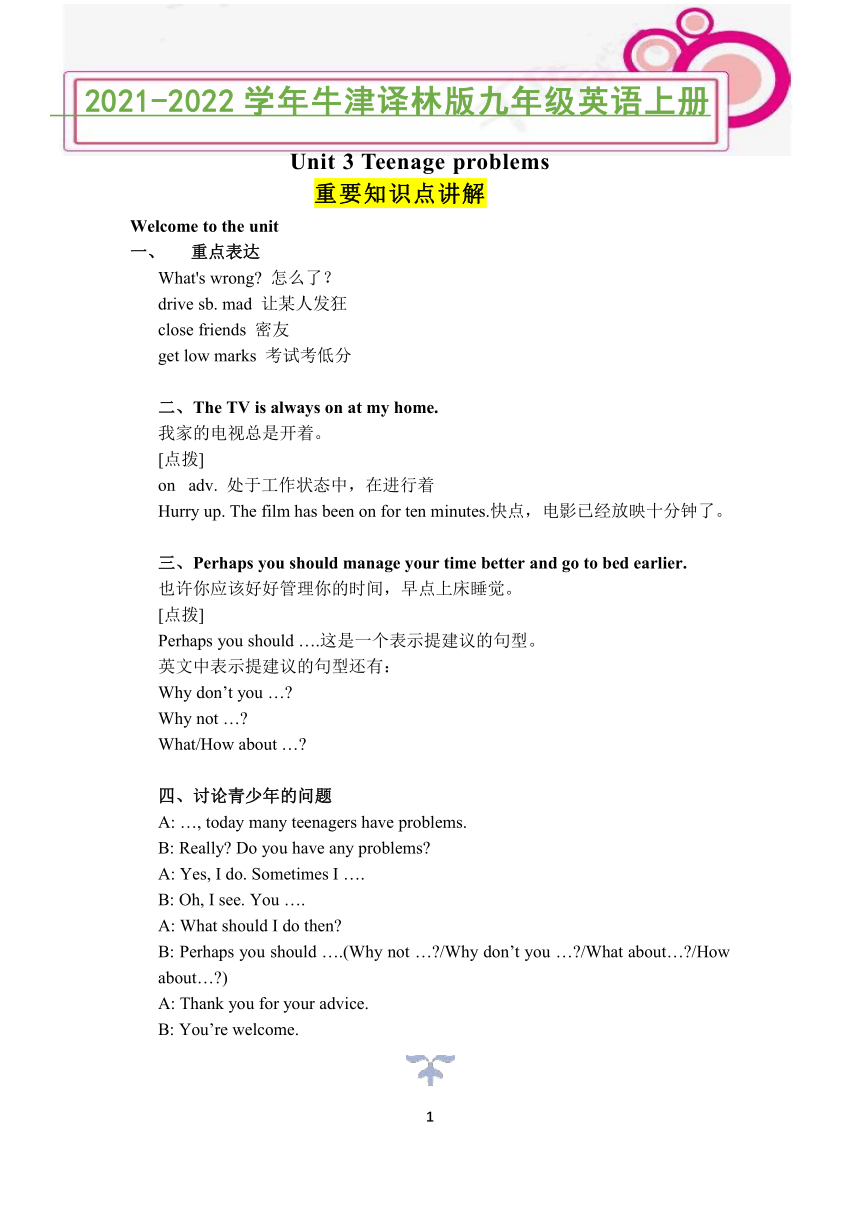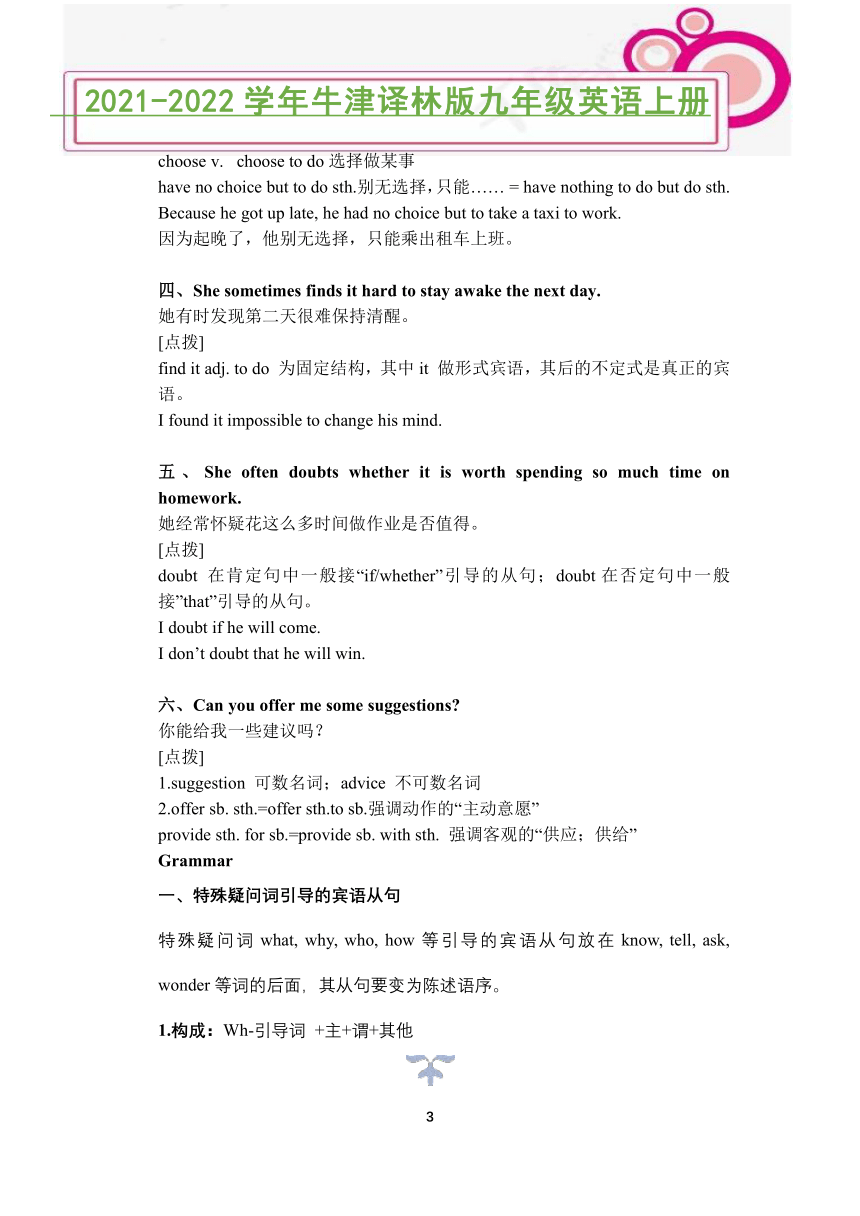牛津译林版九年级英语上册Unit 3 Teenage problems重要知识点讲解
文档属性
| 名称 | 牛津译林版九年级英语上册Unit 3 Teenage problems重要知识点讲解 |

|
|
| 格式 | doc | ||
| 文件大小 | 115.0KB | ||
| 资源类型 | 教案 | ||
| 版本资源 | 牛津译林版 | ||
| 科目 | 英语 | ||
| 更新时间 | 2021-07-28 16:55:58 | ||
图片预览



文档简介
Unit 3 Teenage problems
重要知识点讲解
Welcome to the unit
重点表达
What's wrong? 怎么了?
drive sb. mad 让某人发狂
close friends 密友
get low marks 考试考低分
二、The TV is always on at my home.
我家的电视总是开着。
[点拨]
on ?adv. 处于工作状态中,在进行着
Hurry up. The film has been on for ten minutes.快点,电影已经放映十分钟了。
三、Perhaps you should manage your time better and go to bed earlier.
也许你应该好好管理你的时间,早点上床睡觉。
[点拨]
Perhaps you should ….这是一个表示提建议的句型。
英文中表示提建议的句型还有:
Why don’t you …?
Why not …?
What/How about …??
四、讨论青少年的问题
A: …, today many teenagers have problems.
B: Really? Do you have any problems?
A: Yes, I do. Sometimes I ….?
B: Oh, I see. You ….?
A: What should I do then??
B: Perhaps you should ….(Why not …?/Why don’t you …?/What about…?/How about…?)
A: Thank you for your advice.
B: You’re welcome.
Reading
一、重点表达
know how to deal with sth.知道怎样处理某事
have no choice but to do sth. 别无选择只能做某事
stay up (late) 熬夜,迟睡觉
stay awake 保持清醒
spare time 空闲时间
be worth doing sth. 值得做某事
offer sb. sth. = offer sth. to sb. = provide sth. for sb.= provide sb. with sth. 给某人提供……
be (well) worth spending time (非常/很)值得花时间
be crazy about 对……痴迷
get into trouble 惹麻烦
allow sb. to do 不准某人做……
be strict with sb. 对某人很严格
achieve a balance between A and B 在A和B之间找到平衡
二、…I do not know how I should deal with it.
我不知道我该如何处理它。
[点拨]
deal ?vi.“对付,处理”
deal with sth. 处理某事物,how to deal with 意为“如何处理”,与what to do with意思相近。
I don't know how to deal with the rubbish.= I don't know what to do with the rubbish.我不知道如何处理这些垃圾。
[辨析]deal with 和do with
你怎样处理这个问题?How will you deal with the problem?
我们不知道如何去对付这些困难。We don't know what to do with the difficulty.
三、…, and I have no choice but to do it.
我别无选择只能做家庭作业。
[点拨]
choice n. “选择”→?
choose v. ?choose to do选择做某事?
have no choice but to do sth.别无选择,只能…… =?have nothing to do but do sth.
Because he got up late, he had no choice but to take a taxi to work.
因为起晚了,他别无选择,只能乘出租车上班。
四、She sometimes finds it hard to stay awake the next day.?
她有时发现第二天很难保持清醒。
[点拨]
find it adj. to do 为固定结构,其中it 做形式宾语,其后的不定式是真正的宾语。
I found it impossible to change his mind.
五、She often doubts whether it is worth spending so much time on homework.
她经常怀疑花这么多时间做作业是否值得。
[点拨]
doubt 在肯定句中一般接“if/whether”引导的从句;doubt在否定句中一般接”that”引导的从句。
I doubt if he will come.
I don’t doubt that he will win.
六、Can you offer me some suggestions??
你能给我一些建议吗?
[点拨]
1.suggestion 可数名词;advice 不可数名词
2.offer sb. sth.=offer sth.to sb.强调动作的“主动意愿”
provide sth. for sb.=provide sb. with sth. 强调客观的“供应;供给”
Grammar
一、特殊疑问词引导的宾语从句
特殊疑问词what, why, who, how等引导的宾语从句放在know, tell, ask, wonder等词的后面,其从句要变为陈述语序。
1.构成:Wh-引导词 +主+谓+其他
I wonder what I should do.
Daniel does not know whom he should talk to.?
2.用法:
(1)遵守主句和从句的时态呼应;
(2)从句中要用陈述语序而不用疑问语序,引导词 + 主语 + 谓语 + 其他;
How old is Tom? I want to know.→I want to know how old Tom is.
(3)含有助动词do, does, did的疑问句变为宾语从句时要将帮助构成疑问句的助动词do does, did 去掉,从句中的谓语动词要根据主句的时态做出相应的变化;
When did the train leave? I want to know. → I want to know when the train left.
What time did she get up? The young man asked. → The young man asked what time she got up.
(4)如果宾语从句中的引导词恰好在从句中充当主语或主语的定语,则句子保持原有结构。
What’s the matter with her? Can you tell me? → Can you tell me what’s the matter with her?
What has happened to him? We don’t know.→ We don’t know what has happened to him.
二、提建议的句型
Why not …?
Why don’t you …?
What/How about …?
Let’s ….
Shall we …?
Perhaps you should ….
[注意]
Why not …?是Why don’t you …?的省略形式,后跟动词原形。
What/How about …?后跟名词、代词或动名词。
Let’s ….后跟动词原形。
Shall we …?后跟动词原形。
Perhaps you should ….后跟动词原形。
在宾语从句的运用中我们需特别注意的有:引导词、从句中用陈述句语序、时态一致人称变化、注意标点。
Integrated skills
一、给他人提建议的句型
A: I’ve got a problem, and I feel angry/sad/worried/stressed…
B: I’m sorry to hear that. What’s it?
A: …
B: I think…/Why don’t you…/How about…
A: OK, I’ll try. Thanks for listening to my problem and giving me advice.
B: My pleasure.
二、重点表达
go over 复习; 回顾
Don't mention it.不客气。
三、I’m very worried.
我非常担心。
[点拨]
worried ?adj. ?担心的, 烦恼的。可用于系表结构, 主语一般是人。
be worried about sth. /sb
worry ?vi.担心 ? ?vt. 困扰
worry about sth./ sb.= be worried about sth. /sb (某人)担心某人或某事
sth. worries sb. ?某事困扰某人
Task
Useful expressions
(Thanks)
Thank you for telling me about your problems.
Thanks for writing to me about your problems.
(Problems &?suggestions)
You are unhappy with …
You also worry about …
You always feel sad/angry/stressed about …
Many students of our age have this problem.
What/How about …?
Why don’t you/not …?
Perhaps you should…
You had better…
(Your hope)
I hope you think my advice is worth taking.
I hope you think my advice is valuable to you.
2
重要知识点讲解
Welcome to the unit
重点表达
What's wrong? 怎么了?
drive sb. mad 让某人发狂
close friends 密友
get low marks 考试考低分
二、The TV is always on at my home.
我家的电视总是开着。
[点拨]
on ?adv. 处于工作状态中,在进行着
Hurry up. The film has been on for ten minutes.快点,电影已经放映十分钟了。
三、Perhaps you should manage your time better and go to bed earlier.
也许你应该好好管理你的时间,早点上床睡觉。
[点拨]
Perhaps you should ….这是一个表示提建议的句型。
英文中表示提建议的句型还有:
Why don’t you …?
Why not …?
What/How about …??
四、讨论青少年的问题
A: …, today many teenagers have problems.
B: Really? Do you have any problems?
A: Yes, I do. Sometimes I ….?
B: Oh, I see. You ….?
A: What should I do then??
B: Perhaps you should ….(Why not …?/Why don’t you …?/What about…?/How about…?)
A: Thank you for your advice.
B: You’re welcome.
Reading
一、重点表达
know how to deal with sth.知道怎样处理某事
have no choice but to do sth. 别无选择只能做某事
stay up (late) 熬夜,迟睡觉
stay awake 保持清醒
spare time 空闲时间
be worth doing sth. 值得做某事
offer sb. sth. = offer sth. to sb. = provide sth. for sb.= provide sb. with sth. 给某人提供……
be (well) worth spending time (非常/很)值得花时间
be crazy about 对……痴迷
get into trouble 惹麻烦
allow sb. to do 不准某人做……
be strict with sb. 对某人很严格
achieve a balance between A and B 在A和B之间找到平衡
二、…I do not know how I should deal with it.
我不知道我该如何处理它。
[点拨]
deal ?vi.“对付,处理”
deal with sth. 处理某事物,how to deal with 意为“如何处理”,与what to do with意思相近。
I don't know how to deal with the rubbish.= I don't know what to do with the rubbish.我不知道如何处理这些垃圾。
[辨析]deal with 和do with
你怎样处理这个问题?How will you deal with the problem?
我们不知道如何去对付这些困难。We don't know what to do with the difficulty.
三、…, and I have no choice but to do it.
我别无选择只能做家庭作业。
[点拨]
choice n. “选择”→?
choose v. ?choose to do选择做某事?
have no choice but to do sth.别无选择,只能…… =?have nothing to do but do sth.
Because he got up late, he had no choice but to take a taxi to work.
因为起晚了,他别无选择,只能乘出租车上班。
四、She sometimes finds it hard to stay awake the next day.?
她有时发现第二天很难保持清醒。
[点拨]
find it adj. to do 为固定结构,其中it 做形式宾语,其后的不定式是真正的宾语。
I found it impossible to change his mind.
五、She often doubts whether it is worth spending so much time on homework.
她经常怀疑花这么多时间做作业是否值得。
[点拨]
doubt 在肯定句中一般接“if/whether”引导的从句;doubt在否定句中一般接”that”引导的从句。
I doubt if he will come.
I don’t doubt that he will win.
六、Can you offer me some suggestions??
你能给我一些建议吗?
[点拨]
1.suggestion 可数名词;advice 不可数名词
2.offer sb. sth.=offer sth.to sb.强调动作的“主动意愿”
provide sth. for sb.=provide sb. with sth. 强调客观的“供应;供给”
Grammar
一、特殊疑问词引导的宾语从句
特殊疑问词what, why, who, how等引导的宾语从句放在know, tell, ask, wonder等词的后面,其从句要变为陈述语序。
1.构成:Wh-引导词 +主+谓+其他
I wonder what I should do.
Daniel does not know whom he should talk to.?
2.用法:
(1)遵守主句和从句的时态呼应;
(2)从句中要用陈述语序而不用疑问语序,引导词 + 主语 + 谓语 + 其他;
How old is Tom? I want to know.→I want to know how old Tom is.
(3)含有助动词do, does, did的疑问句变为宾语从句时要将帮助构成疑问句的助动词do does, did 去掉,从句中的谓语动词要根据主句的时态做出相应的变化;
When did the train leave? I want to know. → I want to know when the train left.
What time did she get up? The young man asked. → The young man asked what time she got up.
(4)如果宾语从句中的引导词恰好在从句中充当主语或主语的定语,则句子保持原有结构。
What’s the matter with her? Can you tell me? → Can you tell me what’s the matter with her?
What has happened to him? We don’t know.→ We don’t know what has happened to him.
二、提建议的句型
Why not …?
Why don’t you …?
What/How about …?
Let’s ….
Shall we …?
Perhaps you should ….
[注意]
Why not …?是Why don’t you …?的省略形式,后跟动词原形。
What/How about …?后跟名词、代词或动名词。
Let’s ….后跟动词原形。
Shall we …?后跟动词原形。
Perhaps you should ….后跟动词原形。
在宾语从句的运用中我们需特别注意的有:引导词、从句中用陈述句语序、时态一致人称变化、注意标点。
Integrated skills
一、给他人提建议的句型
A: I’ve got a problem, and I feel angry/sad/worried/stressed…
B: I’m sorry to hear that. What’s it?
A: …
B: I think…/Why don’t you…/How about…
A: OK, I’ll try. Thanks for listening to my problem and giving me advice.
B: My pleasure.
二、重点表达
go over 复习; 回顾
Don't mention it.不客气。
三、I’m very worried.
我非常担心。
[点拨]
worried ?adj. ?担心的, 烦恼的。可用于系表结构, 主语一般是人。
be worried about sth. /sb
worry ?vi.担心 ? ?vt. 困扰
worry about sth./ sb.= be worried about sth. /sb (某人)担心某人或某事
sth. worries sb. ?某事困扰某人
Task
Useful expressions
(Thanks)
Thank you for telling me about your problems.
Thanks for writing to me about your problems.
(Problems &?suggestions)
You are unhappy with …
You also worry about …
You always feel sad/angry/stressed about …
Many students of our age have this problem.
What/How about …?
Why don’t you/not …?
Perhaps you should…
You had better…
(Your hope)
I hope you think my advice is worth taking.
I hope you think my advice is valuable to you.
2
